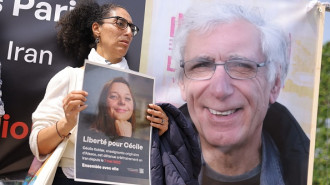Syria opposition chief says peace efforts 'paralysed'
Syria's opposition chief on Saturday said peace efforts were "paralysed" amid a lack of will from key international powers, after meeting the latest UN envoy tasked with ending the civil war.
Norwegian Geir Pedersen replaced Staffan de Mistura this month to become the fourth United Nations negotiator aiming to resolve almost eight years of conflict.
The diplomat faces the daunting task of rekindling moribund peace talks and succeeding where his three predecessors failed.
He met opposition leader Nasr al-Hariri on Friday in Riyadh, where the Syrian lives in exile, after holding talks with regime representatives in Damascus.
"Pedersen is the fourth emissary and was preceded by other respected envoys," Hariri told AFP.
"The absence of international will to push towards a political solution has hampered the UN and its envoys from doing anything."
De Mistura ended his four-year tenure with an abortive push to form a committee tasked with drawing up a post-war constitution after seeing repeated rounds of talks in Geneva come to nothing.
Twitter Post
|
During his time he saw the UN-led efforts overshadowed by separate negotiations backed by regime allies Russia and Iran and opposition supporter Turkey in Kazakhstan's capital Astana.
"Some parties from Astana who support the regime are continuing to obstruct the formation of the (constitutional) committee," Hariri said.
"The political process is paralysed," he said, calling for the different international efforts to work hand-in-hand and not compete against each other.
The Syrian war began when Bashar al-Assad responded with military force to peaceful protests demanding democratic reforms during the Arab Spring wave of uprisings.
Hundreds of thousands of civilians have been killed in the war, mostly by the regime and its powerful allies, and millions have been displaced both inside and outside of Syria.
With key military backing from Russia, Assad's forces have retaken large parts of Syria from rebels and jihadists, and now control almost two-thirds of the country.
A drive to bring the Syrian regime back into the Arab fold also seems underway, with the United Arab Emirates reopening their embassy in Damascus last month.
Hariri insisted that it remained "impossible" for millions of Syria refugees living oversees to return or for the country to be rebuilt "without a political solution" to the war.
"The countries of the free world will not pay money to a criminal regime to rehabilitate infrastructure it has destroyed itself," he said.





 Follow the Middle East's top stories in English at The New Arab on Google News
Follow the Middle East's top stories in English at The New Arab on Google News

![The law could be enforced against teachers without prior notice [Getty]](/sites/default/files/styles/image_330x185/public/2178740715.jpeg?h=a5f2f23a&itok=xMdFOAIF)
